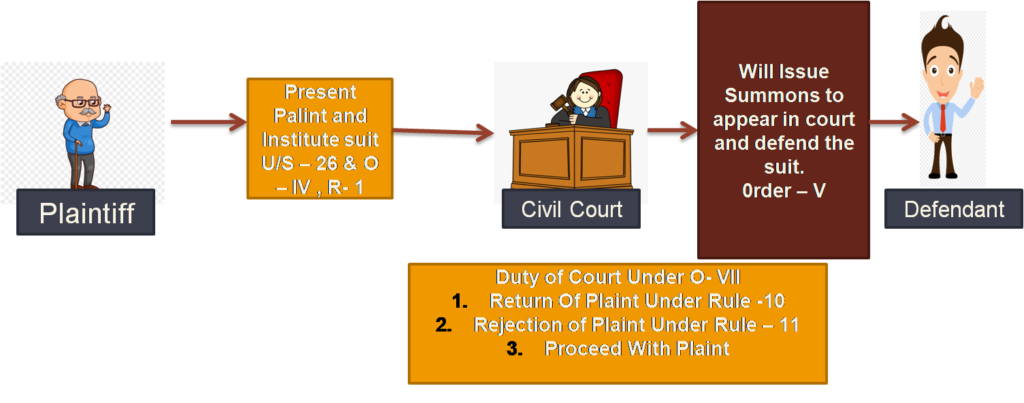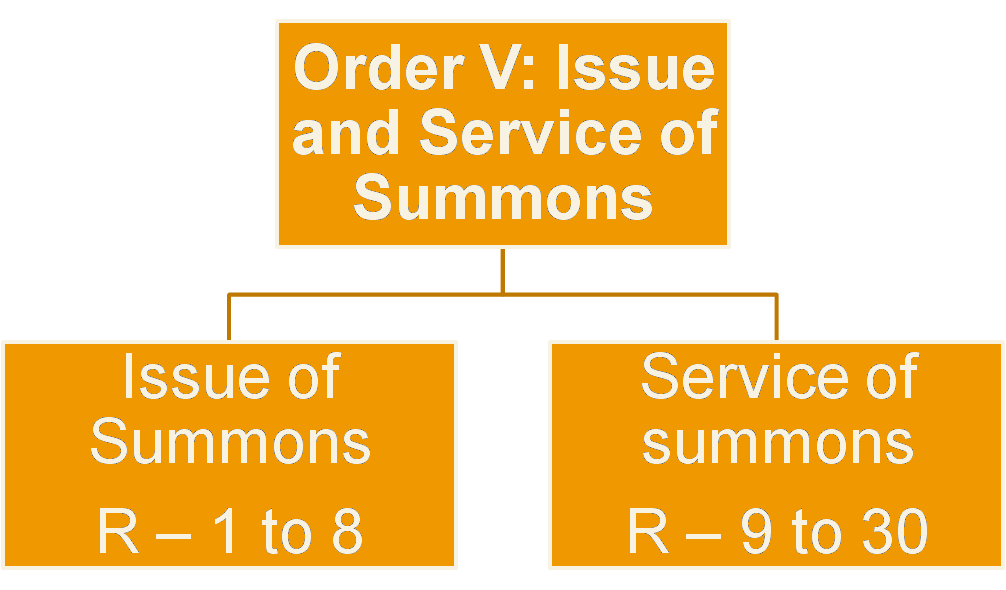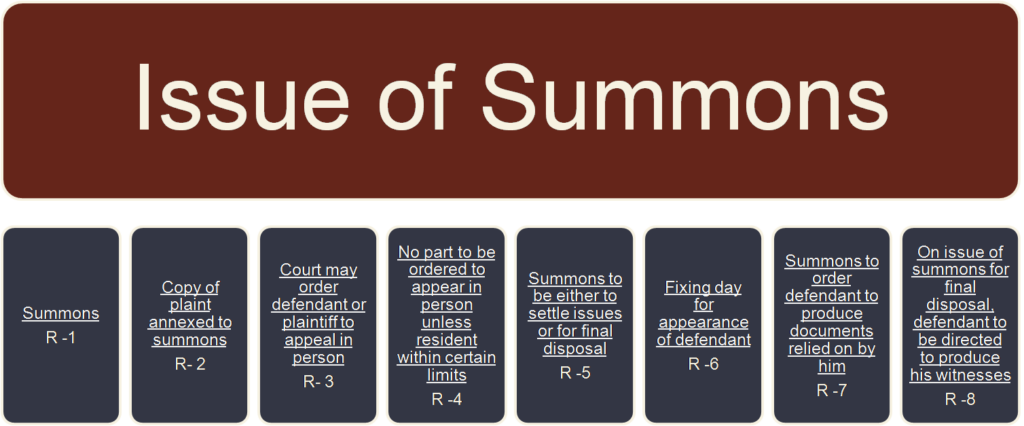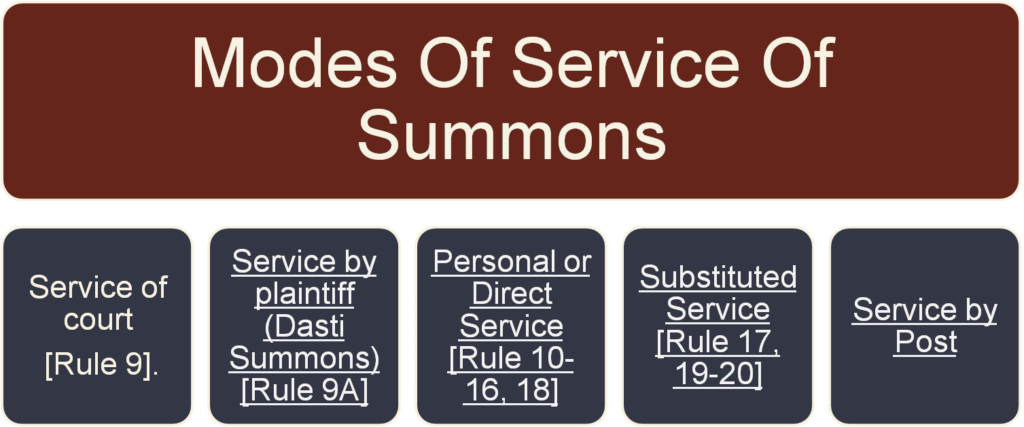Summons
Sec 27, 28, 29, 30, 31, 32 of CPC 1908
Order – V and XVI

Section – 27 And Order – V Of CPC 1908

A summons is a legal document issued by a Competent Court seeking before it the presence of any individual / entity involved in a legal proceeding.
The term “summons” has not been explicitly defined under any statute. However, the essential ingredients of a summons can be found in both the Code of Civil Procedure, 1908 as well as the Code of Criminal Procedure, 1973.
According to P. Ramanatha Aiyar’s Law Lexicon, a summons is a process issued from the office of a court of justice requiring the persons to whom it is addressed to attend the court for the purpose therein stated[i]. In Wharton’s Law Lexicon, a summons is defined as the means by which one party brings the other before a judge to settle matters of details in the procedure of a suit
One Of Principle Of Natural Justice is Audi Alteram Partem which means lets the other side to be heard as well , one of the fundamental rules in the administration of Justice and fair trial. When the plaintiff institute a Suit in the Court by placing all the facts regarding the infringement of his legal right and on that basis claim relief thereof, the Court also want to hear the facts from the defendant side , so issue summons for that purpose
A summons is issued to inform the person, to whom it is issued, about his involvement in the legal proceedings. It is to give him a chance to set the record straight with the court, give his version of the facts and defend himself. Without such information being passed, the trial won’t be fair and would be against the rule of law and principles of natural justice.


The summons as contemplated in Rule 1 is for the attendance of the defendant. It says that once a plaint is admitted the court is required to send the notice of such admission to the defendant and then for the purpose of his appearance and to answer (reply) the allegations made against him in the plaint. The summons are served on the defendant
This appearance and answer (in the form of a Written Statement) must be made within 30 days from the date of service of summons (being duly received) and may be extended to further such period as may be granted by the court not beyond 90 days from such service. Therefore, further 60 days’ extension may be granted, if the case requires.
This does not mean that no further extension may be granted after the period of 90 days is over, but it must be made only in exceptional circumstances, if the defendant satisfies the court of an exceptional cause for not appearing and that he was not negligent. It is not necessary to issue summons when the defendant is in the court at the time of presentation of the plaint and admits the claim.
Issue of Summons
Generally, a summons must contain:
- i. Reason (Purpose) for sending it,
- Signature of the Judge and seal of the court,
iii. Specified date of appearance of the defendant,
- Copy of plaint,
- Appropriate directions.
This order must be read with Section 27-32 of CPC, 1908
Section 27: Summons to Defendants Section 27 of CPC stipulates that where a suit has been duly instituted by filing a plaint, the first duty of the court is to issue summons calling on the defendant to appear and answer the claim and such summons may be served in a manner prescribed in the rules mentioned in Order V of the first schedule and on such day not beyond 30 days from the date of the institution of the suit.
Order V Rule 2 talks about that when summon is to be sent then it is necessary to annexed a copy of plaint with it.
Order V Rule 3: Court may order defendant or plaintiff to appear in person: The Court shall order the defendant and the plaintiff to appear on the same day as specified, in person, if it is so required
Order V Rule 4: No party to be ordered to appear in person unless resident within local limits
Q. When can a party be asked to appear personally?
No party will be ordered to appear personally unless
1.He resides within local limits of courts’ jurisdiction.
2.Where he resides within 50 miles from the court-house, or
3.Beyond such jurisdiction but within 200 miles from the court and where 5/6th distance can be covered by Railways or steamers or other public conveyance.
There are certain provisions where there is an exemption from personal appearance, such as
- Section 132, in case of certain women like Pardanashin lady,
- Section 133, in case of other person like President, Vice-President, etc.
Order V Rule 5: Summons to be either to settle issues or for final disposal The summons may be issued for settlement of issues or for final disposal of the suit and the court shall at the time of issuing the summons specify for what purpose summons are being issued and it must contain a direction accordingly. The Court of Small Causes shall issue summons for final disposal only
Order V Rule 6: Fixing day for appearance of defendant The following factors should be looked into while fixing the date for appearance
1.The current business of the court,
2. The place of residence of the defendant,
3. Time necessary for service of summons,
4. Sufficient time to enable defendant to prepare his defense
Order V Rule 7: Summons to order defendant to produce documents relied on by him It shall be ordered to the defendant in the summons to produce all the document or copies thereof specified in Order VIII Rule 1 A to produce on which he intends to rely in his support.
Order V Rule 8: On issue of summons for final disposal, defendant to be directed to produce his witnesses In the summons for final disposal of the suit the defendant shall be directed to produce all the witness upon whose evidence he relies for his defence at the day fixed for appearance.

Service Of Summons
Order V Rule 9: Delivery of summons by Court- This rule provides for the manner in which the summons must be served, that if the defendant or his agent is a resident within the jurisdiction of the court, such summons shall be served either by officer of the court known as process server or bailiff or by such courier services as are approved by the court
Furthermore Sub-Rule 3 provides for the manner in which the summons may be served. The service of summons may be made by delivering or transmitting a copy to the defendant or his duly authorised agent by:
(a)Registered Post acknowledgement due, or
(b)Speed Post or courier service approved by the High Court or the District Court, or
(c)Any other means of transmission like fax message or electronic mail service, etc.
The service of summons under this sub-rule 3 shall be made on the expenses of the plaintiff.
Where the summons if returned back to the court with the endorsement that the defendant or his agent refused to accept the summons when tendered or transmitted to him, the court shall declare that the summons had been duly served on the defendant.
In the following cases the court may declare deemed service of summons (presumption)-
(a)The refusal or non-acceptance by the defendant,
(b)Where the summons was properly addressed, prepared and duly sent by registered post or acknowledgement due and having been lost or mislaid and wasn’t received by the court within 30 days from the date of issue of summons.
(c)An Endoresement purporting to have been made by Postal/Couries Agency Employee to the effect that defendant /Agent refuses to accept the summons.
Rule 9A: Summons given to the plaintiff for service The types of summons provided under Rule 9A are issued by the court in addition to the manner provided under Rule 9. In this kind of summons, the plaintiff’s is allowed to served the summons personally to the defendant. Such summons must be sealed and signed.
Dasti Summons – Dasti is a Persian word means by hand . A dasti Summons is required to be served by hand , i.e, in person. It can be served by the party concerned (plaintiff) or by his advocate.
Following the recommendations of Malimath Committee , which acknowledge the problem of delay in service of summons , O-V R – 9A was inserted into CPC 1908 by an Amedment Act 2002.
The plaintiff must take the acknowledgement (R-16)from the defendant and shall endorse a return by stating the time and manner of service of original summons(R-18). Such summons may be served by the court by a re-issue and in a normal manner. These summon are known as Dasti Summons.
Personal or Direct Service [Rule 10-16, 18]
Rule 10 to 16 and 18 deals with the personal or direct service of summons upon the defendant. This is an ordinary mode of service of summons
Rule 10: Mode of Service: Service of the summons shall be made by delivering or tendering a copy thereof signed by the judge or such officer as he appoints in this behalf, and sealed with the seal of the court.
Rule 11: Service on several defendants- Where there are two or more defendants, service shall be made on each of them.
Rule 12: Service to be on defendant in person when practicable, or on his agent- The summons must be served to the defendant in person or to his authorised agent
Rule 13: Service on agent by whom defendant carries on business- When the suit relates to any business or work and is against a person not resident within the jurisdiction of the court issuing summons, such summons may be served upon any manager or agent who personally carries on such business or work and is within the local limits of the court.
Rule 14: Service on agent in charge in suits for immovable property- In a suit to obtain a relief with respect to an immovable property or for suit for compensation over such property, it would be sufficient that the summons is served upon the agent who is in charge of the property
Rule 15: Where service may be on an adult member of defendant’s family- In cases where the summons cannot be served due to absence of defendant for a reasonable time and the agent also is not available to receive summons, then such service may be made to an adult member residing with the defendant. It can be served both on male or female but only on adult member of the family. In such cases a servant is not considered the family member of the defendant. Also when adult female members of defendants refused to receive suit summons, a conclusion can be drawn that summons are served on defendants in view of Order V Rule 15, CPC.
Rule 16: Person served to sign acknowledgement- The serving officer shall require the signature of the person accepting the summons to an acknowledgement of the service endorsed on the original summons
Rule 18: Endorsement of time and manner of service- The serving officer in all cases where the summons has been served under Rule 16, shall endorse or annex on the original a return 7 stating the time and manner of service and name or address of the person identifying the person or witnessing the delivery.
Substituted Service [Rule 17, 19-20]
Substituted service means the service of summons by a mode which is substituted for the ordinary mode of service of summons.
Allahabad High Court in the case of Johri Lal v. Income Tax Commissioner 1976 held that It is not service in the ordinary sense of the word. It is service in an artificial sense proceeding upon a fiction imported by necessity. A special mode of procedure has been proscribed, and it is incumbent for the purpose of effecting such service that the entire procedure specifically mentioned in the rule should receive full compliance
Andra High Court in the case of Maganti Krishna Durga, vs Maganti Anil Kumar, on 2 April, 2015 held that it is the service of last resort and when there is a publication of notice in newspaper it must be daily newspaper having wide circulation in e locality in which the respondent/defendant is last known to have actually and voluntarily resided or carried on business or personally worked for gain
Not a matter of right
Allahabad High Court in the case of Om Prakash vs Prakash Chand And Ors. on 8 July, 2004 held that the aforesaid provisions of the CPC make it clear that substituted service is permissible, provided the Courts record the reasons after being fully satisfied that the service cannot be effected in an ordinary manner and it cannot be taken as a matter of right. Party cannot ask the Court that it wants to serve the defendant/respondent by substituted service. The Courts have deprecated the practice of filing such an application and categorically held that substituted service is not permissible unless the Court records the reasons reaching the conclusion that it is not possible to serve the defendant/respondent in an ordinary manner.








No comment